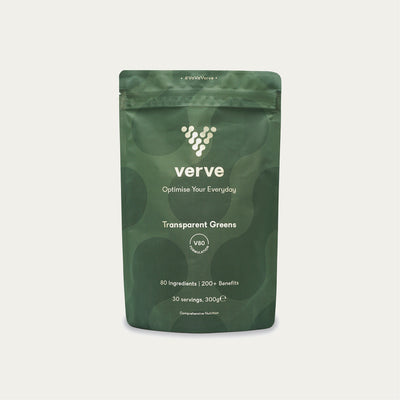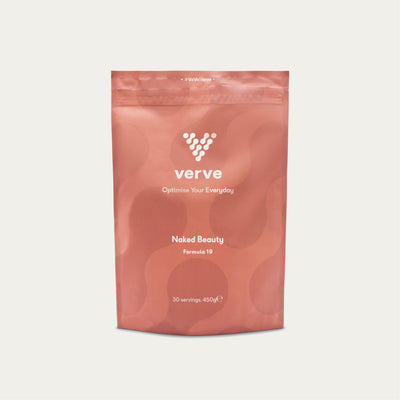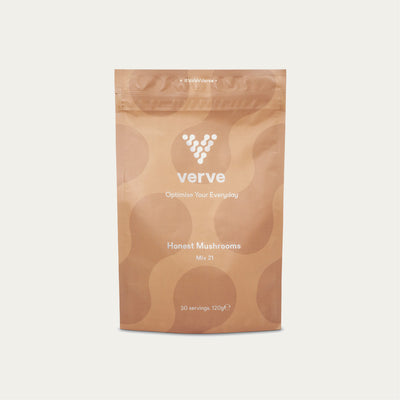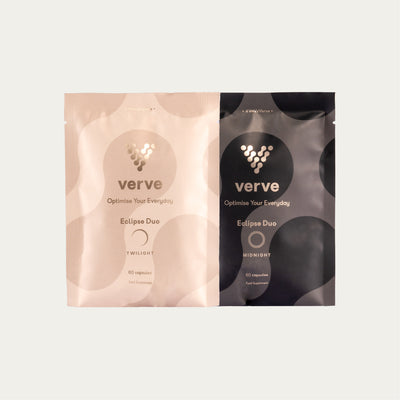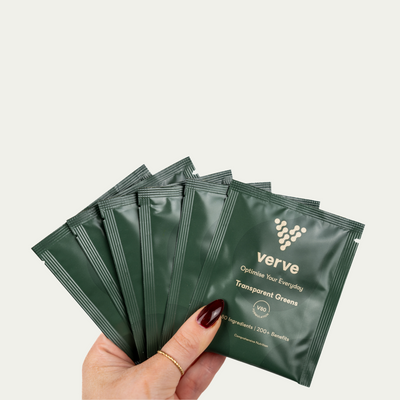Vitamin D
Vitamin D, aptly nicknamed the sunshine vitamin, is essential for women over 50.
With less exposure to sunlight during the UK's many overcast days, maintaining adequate vitamin D levels is a common concern.
This vitamin is vital for calcium absorption, which is critical for bone health and reducing the risk of osteoporosis. It also supports the immune system and muscle function.
Women in their 50s should aim for vitamin D supplements, especially during the darker months, to ensure they are getting the recommended daily amount.
Benefits:
- Enhances calcium and phosphorus absorption for bone health
- Supports immune function
- Contributes to muscle health
Recommended Dosage/NRV: 5UG
Vitamin B12
Vitamin B12 is paramount for maintaining healthy nerve cells and producing DNA.
As the body ages, absorbing vitamin B12 from food can become more challenging, so it makes sense to supplement.
Vitamin B12 is also crucial for preventing megaloblastic anaemia, which makes people tired and weak.
Including vitamin B12 in your diet through animal products or supplements is especially important for those over 50, supporting cognitive function and energy levels.
Benefits:
- Essential for nerve function and DNA synthesis
- Reduces the risk of megaloblastic anaemia
- Supports energy levels and cognitive health
Recommended Dosage/NRV: 2.5UG daily
Calcium
Calcium is another nutrient that deserves attention, particularly for postmenopausal women who are at increased risk of bone loss.
It’s essential for maintaining strong bones and teeth, and it also has a role in blood clotting and muscle contraction. Ensuring you have a diet rich in calcium or taking a supplement can help mitigate the risk of bone-related conditions.
- Benefits:
- Vital for strong bones and teeth
- Important for blood clotting and muscle contractions
- May help prevent osteoporosis
- Recommended Dosage/NRV:
- 700 milligrams daily
Magnesium
Often overshadowed by other nutrients, magnesium is a powerhouse mineral.
It's involved in more than 300 enzymatic reactions in the body, including energy creation, muscle movements, and nervous system regulation. As magnesium assists with calcium absorption, it's particularly beneficial for bone health. Including magnesium-rich foods or a supplement in your diet can help maintain optimal health.
- Benefits:
- Supports over 300 enzymatic reactions, including energy production
- Helps with nerve and muscle function
- Assists in maintaining bone health
- Recommended Dosage/NRV: 375mg
Collagen
Collagen is a key protein that helps to keep our skin supple and our joints functioning properly. With age, our body's ability to produce collagen diminishes, which can lead to common signs of aging such as wrinkles and joint pain. For women over 50, boosting collagen can be particularly beneficial, as it supports the skin's elasticity and the health of connective tissues.
Benefits:
- Encourages a youthful appearance by contributing to the skin's elasticity and hydration.
- Essential for maintaining healthy joints and may alleviate discomfort associated with joint degeneration.
- Collagen is a major component of bones, helping to keep them strong and healthy.
- Plays a role in maintaining lean muscle mass, which is important for overall health and mobility.
Recommended Dosage/NRV: While there is no established Nutrient Reference Value (NRV) for collagen, quality supplements typically provide between 5-15 grams per serving.
Omega-3 Fatty Acids
While not a vitamin, omega-3 fatty acids are essential fats that play an important role in heart health, which can become a concern for women over 50.
These fats are also known to support brain health and may help to maintain mental sharpness. Since the body can't make them, they must come from the diet, typically through fish or flaxseeds, or via supplements.
- Benefits:
- Promotes heart health and reduces the risk of heart disease
- Supports brain function and mental sharpness
- May help reduce inflammation
- Recommended Dosage/NRV:
- No established NRV, but two portions of fish per week, including one of oily fish, are recommended
Zinc
Zinc is an often-underestimated mineral that plays a vital role in numerous bodily functions. It's crucial for a strong immune system, which is particularly important as we age and our natural immune resilience may wane. Additionally, zinc is involved in the process of cell division and regeneration, making it important for skin repair and wound healing.
For women over 50, ensuring enough zinc in their diet can help support a healthy immune response, promote skin renewal, and even aid in maintaining your sense of taste and smell.
Foods rich in zinc include meat, shellfish, legumes, seeds, and nuts. However, if you find it challenging to get enough zinc from your diet alone, a supplement would be beneficial.
- Benefits:
- Strengthens the immune system
- Fosters cell division and skin repair
- Supports sense of taste and smell
- Recommended Dosage/NRV: 10mg
Ashwagandha
While not a vitamin, ashwagandha deserves recognition for its potential benefits, particularly for women over 50. This ancient herb, rooted in Ayurvedic medicine, is categorised as an adaptogen, meaning it can help the body manage stress.
Ashwagandha is also said to support energy levels, mental clarity, and even improve sleep patterns, which can be a concern during and after menopausal transition.
Furthermore, some studies suggest that ashwagandha may have anti-inflammatory properties and could contribute to better skin health by reducing the visible signs of ageing.
Adding ashwagandha to your health regimen through food supplements could be an excellent way to harness these holistic benefits.
- Benefits:
- Can help the body manage stress (adaptogen)
- May improve energy levels and mental clarity
- Could support better sleep and reduce inflammation
- Recommended Dosage/NRV:
- Dosage varies, often 250-500 milligrams of extract per day, but consult your healthcare provider
Probiotics
Probiotics are beneficial bacteria that help maintain gut health, which is closely linked to the immune system, mood, and overall health.
As digestive efficiency may decline with age, incorporating probiotics through foods like yogurt or supplements can be beneficial.
- Benefits:
- Support gut health and digestion
- Enhance immune function
- Can improve mood balance
- Recommended Dosage/NRV:
- No established NRV, but look for supplements with 1-10 billion CFUs (colony-forming units)
You may also like: Signs Probiotics Are Working
Vitamin C
Vitamin C is celebrated for its role in collagen synthesis, which is crucial for skin health. As the skin's ability to repair itself slows down with age, a sufficient intake of vitamin C can help maintain its strength and elasticity.
Furthermore, this vitamin is a powerful antioxidant and plays a significant role in immune system support, making it especially valuable for women over 50.
- Benefits:
- Crucial for collagen production and skin health
- Serves as a potent antioxidant
- Strengthens the immune system
- Recommended Dosage/NRV: 80mg
Vitamin E
Another skin champion, vitamin E, serves as an antioxidant that helps protect cells from damage caused by free radicals.
It is also known for its benefits in supporting skin health, providing protection against sun damage and the signs of ageing. Including vitamin E in your diet through nuts, seeds, and green leafy vegetables, or considering a supplement, can contribute to maintaining a youthful complexion.
- Benefits:
- Acts as an antioxidant to protect cells from damage
- Supports skin health and protects against UV damage
- May contribute to the prevention of chronic diseases
- Recommended Dosage/NRV:
- 12mg- alpha-tocopherol (the active form) daily
Vitamin K
While vitamin K is often less talked about, it's essential for bone metabolism and maintaining healthy blood clotting. It's also been found to have benefits for heart health, which can be particularly important for women over 50. Leafy greens are a fantastic source, but if your diet is lacking, a supplement might be a good choice.
- Benefits:
- Essential for proper blood clotting
- Plays a role in maintaining bone density
- May support cardiovascular health
- Recommended Dosage/NRV:
- 75ug
Biotin
Biotin, or vitamin B7, is often associated with hair, skin, and nail health.
Although deficiencies are rare, ensuring adequate biotin intake can support the maintenance of strong hair and nails, which can sometimes weaken with age.
Biotin can also aid in energy metabolism, highlighting its role as a beneficial vitamin for overall well-being.
- Benefits:
- Contributes to maintaining healthy hair, skin, and nails
- Supports metabolism and energy production
- Can improve glucose intolerance and balance blood sugar
- Recommended Dosage/NRV:
- 50 micrograms daily
